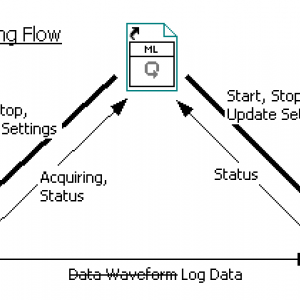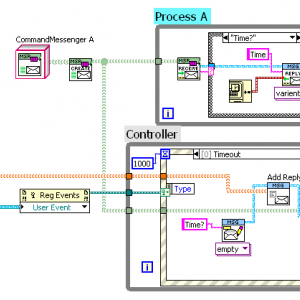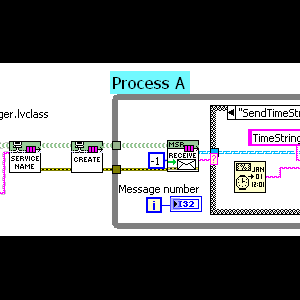About This File
Advanced messaging made simple!
Messenger Library is a library for message passing using a variety of powerful Messaging Patterns, and a set of Templates for easily creating parallel modules to interact with those Patterns. Together, these comprise a powerful and deep framework for rapid application development.
Communication patterns supported and other features include:
- -- Request-and-wait-for-Reply
- -- Asynchronous Request-Reply, where the reply is sent to a "reply address" attached to the request
- -- Scatter-Gather: Requests sent to multiple addresses, with all Replies gathered together in order
- -- Register-Notify, where one process sends a registration message to another in order to subscribe to published messages.
- -- Future Token, a reference to a future Reply not yet made
- -- Asynchronous Dialog: query the User without blocking (User's response sent as a message)
- -- Delayed Request: message sent with a set asynchronous delay
- -- Metronome, a source of precisely-timed periodic messages
- -- Timeout Watchdog: trigger an action if something expected doesn't happen
Freely intermix communication by Queues, User Events or Notifiers.
First-class support for TCP communication, allowing easy interaction of multiple executables using any of the Messaging Patterns. Also supports UDP, including multicast.
Module Templates are simple, consisting of a single VI and a single loop, and are robust against race conditions (unlike the more complex "Producer Consumer" NI templates)
Includes two utilities under the menu "Tools>>Messenger Library":
- -- a utility to create a new parallel modules from a set of well-tested templates
- -- a Manager utility to see all running Modules
Multiple Examples are included. Of particular interest are:
- -- An example developed over a series of YouTube videos (linked below)
- -- A redo of the standard "Continuous Measurement and Logging" Example using Messenger Library
- -- TCP Reconnecting Example, showing easy network communication with handling of temporary disconnects
Note: Messenger Library is intended to promote actor-oriented design, but is not related to the Actor Framework.
***Introductory Videos are on a YouTube channel.***
***A great summary of many Messenger Library sources, provided by Bob W Edwards***
JDP Science Tools group on NI.com.
Original conversation on this work is here.
Now hosted on the LabVIEW Tools Network (but note that the latest version will often be on LAVA)
Edited by drjdpowell
Update
What's New in Version 2.1.7 See changelog
Released
- Significantly-improved palette layout.
- Better Icons, especially for Register-Notify API;
- Better "Create Actor from Template" Tool, with Template Descriptions.
- TCP Cient and Sever Templates. "DEV Top Level"
- Template now includes Config File done with JSONtext.






